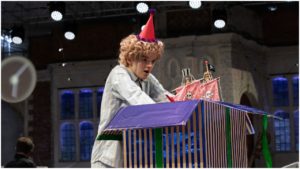
Opera Holland Park 2021 Review: The Pirates of Penzance
A Bold and Bright Vision of Gilbert & Sullivan from John Savournin and Charles Court Opera
By Benjamin PooreCredit: (OHP Marketing/Opera Holland Park)
The last offering from Opera Holland Park’s (OHP) 2021 summer season was another collaboration: W.S. Gilbert and Arthur Sullivan’s “The Pirates of Penzance”, co-produced with Gilbert & Sullivan specialists Charles Court Opera, postponed from last summer.
A Playful Production
How do we imaginatively enter the topsy-turvy world of Gilbert & Sullivan, with its surreally distended rhymes and bizarre twists of fate? Director John Savournin, who also sings the role of the Pirate King, is no stranger to directing comic opera: he has credits for “The Barber of Seville” and “The Gondoliers” amongst others. He offers an intuitive and charming production concept, boosted by Rachel Szmukler’s vivid designs. The stage is set with a toy box and large colored blocks from a child’s playset. During the overture, a young boy—Frederic, one presumes, with his nursemaid Ruth—plays with a toy soldier and a model pirate ship.
We are invited, perhaps, to see the show as a kind of extended childhood reverie, where strange leaps of logic and caricatures belong to the upended world of play and imagination, a place where we take pleasure in the inversion of the everyday. Trevor Eliot Bowes, who sang the Sergeant of Police, did a cameo as a painter-decorator during the overture, as if to suggest that magic lurks just behind the mundane.
It is out of the toy box that Savournin’s Pirate King bursts in the first chorus, in a witty coup de theatre. The toy theme continues across the show. Richard Burkhard’s Major-General, with his fraudulent title and biography, is a literal wind-up merchant, brought back up to full speed in his famous patter song by means of a clockwork crank.
Exaggerated makeup makes Ruth and women of the chorus look like dolls; the three policemen, with their carnival noses, resemble something out of commedia dell’arte; letters from Scrabble appear in an Act two setpiece; the Sergeant of Police springs out like a jack-in-the-box when he finally makes his entrance. It is playful and bold. A powerful use of color and simple shapes help to fill the large space of OHP’s (almost) al fresco stage. Equally consuming are the pantomime characterizations across the board, while the second half’s nocturnal action is evocatively moonlit by Jake Wiltshire, adding to the fantasy, larger-than-life appearance of the opera.
A Balanced Ensemble
Another COVID-era opera means another reduced orchestration. OHP’s resident orchestra, the City of London Sinfonia, again handled things with panache precision from the pit, though shorn of the usual complement of strings. What was lost in the luscious, whipped-cream quality of Sullivan’s lyricism was balanced out by a more punchy musical theatre brightness and attack.
For the most part, the ensemble remained remarkably balanced, providing a thick-enough cushion for Act two’s “Oh, dry the glist’ning tear” chorus, even if a slightly threadbare one at points. These forces were marshaled with wit and élan by David Eaton, who favored brisk tempi that worked well with the spiky ensemble at his disposal, drawing out crisp articulation and punchy accents in “Pray observe the magnanimity” and its recurring music.
Choruses were slimmed back too, with just three policemen and a handful of daughters for the Major-General to flap over, as well as a scattering of pirates. But costuming and makeup gave us characters with large enough personalities to fill out the place where their colleagues might otherwise have been. The trio of policemen, in particular, offered something deliciously Punchinello in mood. Nor did they stint on low notes in the famous policeman’s chorus, dropping some fruity—and effortless—bottom Fs.
John Savournin put in a lively turn as a dark-hued Pirate King, with plenty of richness and swashbuckling gravitas. His particular fach meant no climactic top G in the Pirate King’s big solo number, but you can’t have everything. He was matched by a honeyed Frederic in Peter Kirk, who boasted a decorous legato in “Oh, is there not one maiden breast.” As a character, he’s not the most wildly interesting figure ever conceived for the operatic stage, so there was plenty of scope for Daisy Brown’s vivacious Mabel to have some fun with him in a go-getting and lively performance, chasing him hither and thither. Vocally she impressed with glittering coloratura—strongly sung but funny to boot—and a gleaming sound that stood out in the ensembles. Despite the acoustic challenges the diction was immaculate throughout, consonants pinging from the stage in the ‘paradox’ trio.
Richard Burkhard’s Major-General Stanley hit all the right comic beats, and offered fearsomely quick patter in his famous song—a little too fast, in fact, for the City of London Sinfonia, who could scarcely keep up at certain points. Yvonne Howard is luxury casting for a Ruth. As someone experienced in the heavier Germanic repertoire she brings richness and a luscious lower register to what can sometimes be a rather under-sung role and was a terrific reminder of how important proper singing is when it comes to making Gilbert & Sullivan really glow. It’s an opera with a scattering of small roles—Samuel, Edith, Kate, Isabel—but all were executed with lightness and wit. A perfect summer evening of operetta, abounding with grace and comic poise.


